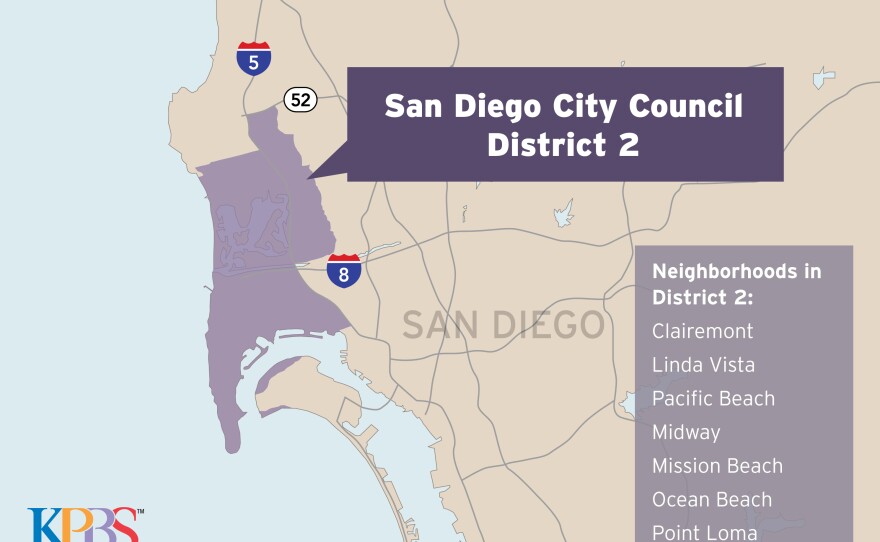San Diego City Councilwoman Lorie Zapf is facing a tougher re-election fight than Republicans had hoped this November, with opponent Jen Campbell mounting a challenge from the left.
Zapf, a Republican first elected in 2010, won the largest share of the votes in the June primary by far — but with 43 percent, she fell short of an outright majority. Campbell, a Democrat who has never run for office before, won 21 percent of the vote.
Still, Democrats see Campbell as their best chance this year of winning a six-vote majority on the City Council. That would allow them to override any potential vetoes from Mayor Kevin Faulconer, a Republican. Both the mayor and council member positions are officially nonpartisan, but party affiliation often shapes how elected officials vote on contentious issues.
Among those contentious issues is the high cost of housing. Both candidates said the city should do more to speed up the approval of new housing, and both acknowledge a shortage of both subsidized and market-rate homes are to blame for San Diego's high housing costs.
But both also oppose plans to allow buildings of up to 100 feet near a future trolley stop in the district at Tecolote Drive. City planners are backing away from those plans under pressure from Zapf and neighborhood groups fearful that taller buildings would block their coastal views.

RELATED: Council Candidates Talk Vacation Rentals, Homelessness In District 2 Race
One housing policy where the two candidates diverge is a change to the city's "inclusionary" ordinance. San Diego requires most new housing developments to either set aside a portion of homes to low-income residents at below-market costs or pay an "in lieu" fee. Most of those fees go toward subsidizing affordable homes elsewhere in the city.
Campbell said she supports recent efforts on the council to either raise the in lieu fee or get rid of that option and instead require developers to include affordable homes in all their projects. Zapf has shown skepticism to that approach in the past. She has been endorsed by the Building Industry Association of San Diego, which generally opposes adding more costs to homebuilding.
Transportation is another area where the two candidates have different priorities. Zapf currently serves on the board of the Metropolitan Transit System and is often the city's de facto representative on the San Diego Association of Governments, or SANDAG, which allocates transportation funding.
Campbell said the city and county should invest more in public transit because it would support the city's efforts to combat climate change.
"We want to help our Climate Action Plan to work, which means we have to reduce greenhouse gases," she said. "What we need to do is make it so we can get out of our automobiles and trucks and get places easily on public transit. And so I'm glad that we're building more trolley lines and we need definitely more trolley line spurs to other areas around the city and the county."
RELATED: San Diego Election 2018: Where Do Candidates Stand On Big Issues?
Zapf said she supports transit as well, but that the government should also be subsidizing ride-sharing services such as Uber and Lyft.
"I've been a big advocate at SANDAG and MTS that we need to really rethink of how we look at transit," she said. "We subsidize trolley rides, we subsidize bus rides. So I've been pushing that we have vouchers to help subsidize ride share."
In her interview, Zapf suggested that she had secured the approval of a change to how the city calculates development impact fees, which are paid by developers and fund a variety of infrastructure projects near their new development. The change, she said, would encourage developers to build smaller, more naturally affordable homes.
"I pushed and got through changing a fee structure that incentivizes smaller units," Zapf said.
The policy did not originate from Zapf's office, however. It has been proposed by Mayor Faulconer in concept, but it has not been finalized, nor has it been approved by the City Council.
Asked to clarify her comments, Zapf said via email: "I did not intend to leave the impression that the DIF recalculation was finalized, since the full council has not yet approved it. However, I am extremely confident that it will be formally approved inasmuch as it is now in the Planning Department's Work Plan and the Mayor's Housing SD Plan. I intend to support it at the council's Infrastructure Committee and I believe that a majority of my colleagues will support it at full council vote."






